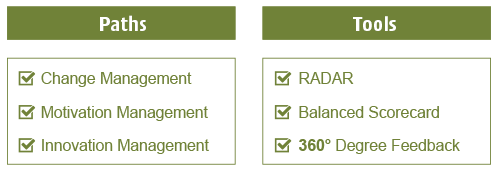Consultation
1. What does this consulting service do?
We help organizations and individuals to get ready to meet their objectives and goals. This usually consists of some or all of the following services:

Please note that some services overlap each other, and in addition there are some services can be mixed between the two levels.
2. What departments can benefit from these services?
All departments that are concerned with HR, quality, HRD, and strategy
3. Can you guarantee that our plan or service provided will get a return on investment?
No. The services offered can help to establish the right track to success, In other words, the service role is to identify the problem/ issue, and recommend appropriate remedies/ solutions. Getting the desired results depends on the implementation stage. “Walking the talk” is the job of the concerned party, whether that is the management in the organization or the individual him/ herself. Essentially, making a good plan is essential, yet to succeed the plan also needs effective implementation.
4. Can you help us measure our results?
We can recommend a suitable tool for evaluating the outcome on both levels. However since measurement is a critical part of managing performance, this process should be handled by an external party or by a trusted team within the organization.
5. Do we really need a development plan?
The answer is probably yes, and the more tasks you have the more complex is the plan you may need to boost your performance. It is recommended that the organizational plan and the individual plan should be linked to each other, for instance, individual goals (tactics) should stem from departmental goals (strategic) However, measuring individual productivity is more complicated since it involves many psychological factors.
6. Why should we ask for a consultation to identify the root of the problem, or to improve our performance, instead of doing these processes ourselves?
First of all, it might be more time-consuming than you expect, because the process contains a number of steps that must be considered in advance, for example, building a development team, drawing up a plan and objectives, selecting an appropriate tool for measuring outcome…etc. You can avoid all these consultative process, by relying on the lecturer’s experience in preparing these materials. Furthermore, third- party feedback is essential to this process, and may raise questions that you might not have thought to have asked.
7. How does the consultation process work?
Each circumstances is exceptional, however, some common steps include the following:
- An initial discussion is recommended to realize your basic needs.
- Reviewing your existing documents (e.g. plans, reports, tools, research, etc.).
- Further discussion to gather detailed information and agree the scope of fees for the project.
- Conduct additional research, as needed.
- Draft a presentation and review it with the client to ensure that all the concerned parties are agreed and involved in the development stage.
- Prepare a draft outline of the development plan for your review.
- Start filling in the details on the draft, and then collect and review your feedback.
- Finalize all reviews and collection plans.
- Coach you in the best way to deliver the development presentation, and on how to address the questions.
- Provide continuing support, including minor updates of the plan with no additional charge.
8. How does the process work?
The development scheme relies on the degree of the problem/ issue and to what extent it remains unsolved, but, preparing all documents or materials needed from the beginning to completion is 4 – 6 weeks.
NB: The real OR expected time can be affected by the quality of your existing documents, also, the lower the level of employee participation, the more complex your issue is. In addition the effectiveness of your HR systems is a vital factor.
9. Will you agree with everything I say?
This depends on your validity and being right in your views. One of the main tasks that we offer is to help you to avoid mistakes. Your ideas and suggestions will be considered if these views are part of the issue and can support our investigative mission.
10. What happens after you have delivered the final documents?
We will stay available, with no extra charge; to response to your enquiries in the follow- up stage, to offer advice or to make any minor changes required to the documents we submitted to you.
11. How do you price your services?
The fee is determined by the following:
- The scope of the project.
- The quality of your existing materials, such as studies, research, annual reports etc., If the recent evidence you have is good then our effort can be significantly reduced; thus, the cost would be decreased accordingly.
- The clarity of your vision, mission and objectives at the strategic and departmental level.
- The degree of your participation in the preparation of your management plan, including your availability and willingness at the studying, forming, and final presentation stages.
- The complexity of your issues and problems.
- The availability of data required for your specific issue.
Due to these factors, the consultancy fees can vary accordingly, so that the price can range from a few thousand Dhs to several tens of thousands.. Nevertheless, the price can’t explain the whole story. After all you can search for a cheap boat butyou can’t guarantee its durability out at sea. Therefore, you should consider all the dimensions affecting your needs.
12. Will you take all or part of your fees in equity?
This can be discussed in advance, but, in general, %35 of the fee should be paid in advance (before starting the third stage).
13. What is your refund policy?
Your advance payment is non-refundable, because of the expenditure for the first three stages, specifically, time spent in hiring us and other opportunities which we have turned away in order to offer you our best service. The rest of the payment is subject to a possible refund if you decide to terminate the project before we have fully earned the subsequent payment. For instance if your fees for the project are broken into three payments, each covering (10) hours of services; the initial payment covers the first (10) hours, and the second payment covers the next 100 hours, so, if you change your mind, at the point at which we have put a total of 15 hours into the project, we will be responsible for refunding the full second half of the payment, since we will have only earned 5 hours of it.
14. Can you send us a sample of your work?
For security purpose, the sample can’t be sent through email, but, you can view some works or plans on our website, otherwise a formal meeting can be arranged to provide a hard copy.
15. What are your qualifications?
The author/lecturer is experienced and qualified, and he holds a masters degree in HRM from England. He has also been admitted as an expert and fellow member of reputable institutions in the United Kingdom.
16. How long will take us to get the desired results?
If the required documents are completed and adequate for discussion and evaluation perhaps 3 – 6 months. A few clients raise productivity rapidly, yet, some never do; thus, the more effort you put in to your project the quicker you can expect a successful conclusion. The most important factor in this matter is that your staff should be actively engaged and fully motivated.
17. Is our organization/ Individual at the right stage to be evaluated?
We would be pleased to assess your service/ performance free of charge. Please contact us for confirmation or start to fill in the application form.
Ongoing support
We don’t stop when the venture or programme plan is complete. We have also established a unit that is ready to help you implement it, either by welcoming your call or email or through you visiting our website and raising your issue.
Training
1. How can I find out if you have places available?
The website will indicate when a course is fully booked.
2. Do you have an online writing class for beginners?
As a matter of fact, I do. The concise Jumpstart is designed to give you an overview of how to get your book written and published. The key ingredient, as you might guess, is confidence. Please visit www.matboona.com
3. What sort of course do you have currently?
The author has designed courses, based on his knowledge and experience. Some prepared courses are as follows:
4. How do I book a place?
Please fill the application form; completed applications will be acknowledged within 7 working days and an invoice issued for the fee. Applicants should have study leave and funding approved prior to application.
5. How can I pay for my course?
If you are accepted on to a course, you will receive an invoice by email. Full payment is required within 21 days to secure the booking, places are reserved provisionally meanwhile. Payment can be made by direct transfer, cheque or debit/credit card (2.5% surcharge on credit cards).
6. When will my booking be confirmed?
Your booking will be confirmed on full payment of fees. You will receive confirmation of your place with further information, including a course timetable. A list of local accommodation is provided for trainees from outside Dubai, UAE.
7. What are the course hours?
Course hours are usually from 08.00 to 14.00, Sunday to Thursday. The course day includes two breaks; the first break is between 10.00 to 10.30, whereas the second is between 12.30 to 14.00.
8. Do you provide accommodation?
The lecturer is not responsible for accommodating the trainee; but he can provide a list of local accommodation for trainees from outside, Dubai, UAE. You will find a variety of hotels; however, we do monitor feedback from other participants. Accommodation details will be provided on confirmation of your booking.
9. Should I book my accommodation and travel now?
Arrangements for accommodation and travel should only be considered when you have a confirmed booking. Participants from outside Dubai are advised not to book travel to the Dubai Centre before checking that there are no changes to the course they wish to attend (minimum 6 weeks prior to the start date). The lecturer will not reimburse expenses if courses are cancelled.
10. What happens if I am not available for the whole course?
Full attendance is a requirement for all courses. Certificates may be withheld if delegates are absent for about 20% of the expected attendance for the course.
11. I can’t find the course I am looking for.
Some courses may not be on our current schedule. If this is the case, you can request to join the mailing list and we will notify you when the next course is planned.
12. Do you accept applicants from overseas?
The lecturer welcomes international delegates. A good level of Arabic/ English language is important including knowledge of the management and culture terminology associated with Arabic culture.
13. Visa requirements for applicants from outside the UAE.
Course applicants from non-GCC countries may require a visa to study in Dubai. We are unable to advise of specific visa requirements. For more information about eligibility of visa requirements for UAE, you can visit this useful website: as follows http://www.dubaifaqs.com/immigration-uae.php
NB: Some visitors may apply for a study visa up to 3 months before their date of travel, a copy of the visa should accompany the course application.
14. Can I attend a course if I am not a qualified in HR or management?
The courses are suitable for all employees who work in management or a similar domain, but for new employees it is recommended that such matters are discussed in advance. All information will be placed in the website. If you need more details or if you have questions about entry criteria you are free to email. Please visit www.matboona.com
15. Is there any work prior to or during the courses?
Usually there will not be any work prior to the course, though this may vary. Full details are available within the course description.
16. What facilities do you provide for course members?
We have arranged in advance for courses to be held in several luxurious places in Dubai, includes theatres and conference rooms in hotels. Most of these premises provide learning zonez with wi-fi access. Snacks, tea and coffee, and beverages are available during the first break. Lunch is not provided during courses; however many places have a good variety of shops and cafes.
17. How do I find the course venue?
The course map will be available on the website. Most of course venues are located in Dubai city. Dubai International Airport is nearby and the district is within easy reach by car -it takes around 15- 20 minutes. Travelling by public transport, Airport Metro Station can take you to the specific place within 10- 15 minutes. Also, there are good local bus links. Get more information on www.rta.gov.ae
18. Can courses be arranged at other venues?
Some courses can be delivered at external venues, bespoke courses can also be considered. In-house problem solving sessions or workshops are available, please email aaamatboona@hotmail.com for details.
19. Cancellations
Our training courses are carefully priced to ensure that we provide a service that is accessible to all. Our training programme is restricted to a specified number of applicants per course. Late cancellations, due to illness or inability to attend, have a significant impact on our overall finance; therefore liability for fees remains with the delegate or their employer.
20. Refunds
Refunds or transfers can be made if written notice is received, with a minimum of 6 weeks notice prior to the start of the course. All refunds or transfers are subject to an administrative fee. We are unable to offer refunds on cancellations arising from events beyond our control; this includes participant illness, or inability to attend at short notice, adverse weather conditions, and transport difficulties. The lecturer reserves the right to cancel the course if there are insufficient enrolments and in this event will refund fees. The lecturer will not be held responsible for any damages incurred as a result of course cancellation.
21. How do I find out about courses in Islamic and Arabic culture?
Courses in Islamic and Arabic culture are organised by the Dubai Islamic Foundation, this course will be introduced recently, please contact DIF directly or use our contact feature for details.


